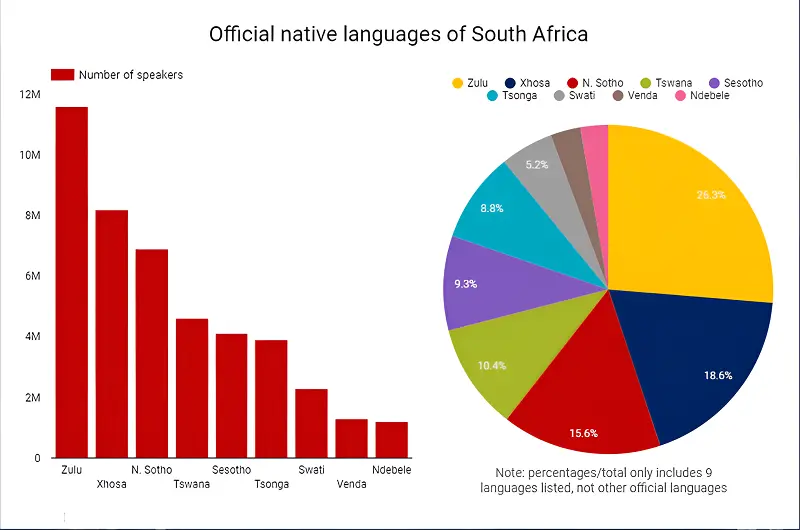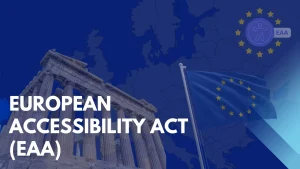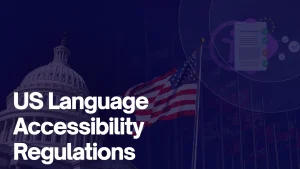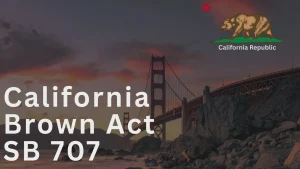South Africa is famous for its stunning nature and incredible wildlife, but what’s just as impressive is its incredible number of Languages of South Africa. Seriously, the country has way more official languages than most places in the world.
Across South African cities such as Joburg or Durban, you hear people communicating in various languages. You get to hear English, Zulu, and Sesotho. It is the norm that after a generation of growth of languages with many cultural people interacting with each other
12 Official Languages (and More)
Back in 1996, after apartheid ended, the government said that 11 languages were official. That means they all got treated the same by the government. In 2023, South Africa added the sign language as its 12th official language. Even with the official languages, South Africa has many other languages, such as Hindi, Tamil, German, and Urdu, which show the different people who came to live here.
You can identify the variety in human existence everywhere in everyday life, such as schools, newspapers, shops, religious places, TV, and other places. Children speak various languages throughout the day to coexist in society. They are not taught at birth but rather learn through their own experience
Indigenous Languages – The Real Deal
Most Black South Africans speak one of the local languages at home. These are broken down into four big groups. There are Nguni languages like isiZulu, isiXhosa, isiNdebele, and siSwati. You hear these a lot in the east and along the coast.
Language is a deeply important slice of every culture’s traditions and history. It is their identity, not simply for communication.
From greeting each other to communicating, their language portrays their feelings, culture, and traditions from everyday life to important events such as weddings, family events, and gatherings. It’s not just words; it’s their background and who they are. It’s how they pass things down to the next generation, too.
English and Afrikaans – From the Past
Afrikaans started from Dutch but mixed with words from German, French, Malay, and African languages. It’s mainly spoken by white Afrikaners and some Coloured communities.
The English brought their language as the official mode of communication. It was not used in their everyday life but over time it has overtaken their local languages in the way they conduct themselves formally and informally.
Nowadays, English is used a lot more in offices, emails, and school lessons. But that doesn’t mean people stopped speaking their other languages. In their personal or day to day lives, locals switch to their own languages subconsciously. In many parts of Africa, the road and communication signs are in their local languages rather than the official language.
Mixing Languages Like It’s Nothing
One cool thing about South Africa is that people switch between languages all the time. Like someone might start talking in English and then switch to isiZulu in the same sentence.
This happens at school, at work, in taxis basically anywhere. It’s not a big deal. People just say whatever comes naturally, depending on who they’re talking to. It’s like having different ways to express yourself, and everyone just goes with it. Sometimes they even throw in slang from more than one language, and it still makes perfect sense.
Most Black South Africans know more than one local language. White, Indian, and Coloured communities usually speak either English or Afrikaans, sometimes both.
Everyday Life in a Language Mix
In a lot of places, you’ll hear a mix of three or four languages in one conversation. Someone might say, “Yoh, this taxi is full, hey, Sizobopha straight,” and no one thinks that’s weird. That’s just how people talk. On TV shows and radio stations, it’s the same thing. It’s more real that way.
Kids pick it up fast, too. When they are interacting with each other. You hear them speak their own language with locals and switch to a different language when speaking with a different tribe or people. They switch with who they are playing with. It is natural; they even teach others about their language and culture without realizing it.
And that’s why South Africa’s languages are so cool. It’s not like school, where you sit down and study them. You hear them all around you at home, at school, on the radio, from your friends, in taxis. It just becomes part of how you live and speak.
So yeah, wild animals are cool and all. But if you really want to know what makes South Africa awesome, just listen to the people talk.
Conclusion
Final thoughts: Yes, South Africa is known for its royal wildlife, breathtaking landscape, and vibrant cities. But if you really want to experience the heart of the nation, then just speak to people. Here, language is not just one tool for communication – it is an expression of identity, culture, and connection. From the greetings of Isizulu in Durban to the African phrases in Cape Town, and the negligence to switch children between English and Sapi in school, tells a story of every conversation inheritance and harmony. On TransLinguist, we celebrate and support this rich linguistic diversity. If your organization needs to help navigate multilingual communication in Africa – or elsewhere contact us to make sure that your message is heard, understood, and respected in every language.
FAQs
How many languages are there in South Africa?
There are 12 languages that are socially legal in South Africa. While as far as 1996 there were 11 recognised languages in the Constitution, the addition of South African Sign Language (SASL) in 2023 extended them to 12.
What are some of the principle languages there?
These are isiZulu, isiXhosa, Afrikaans and English, however, interacting communities will speak two or more languages depending on the specific context.
3. What is the significance of language in South African culture?
Language is not merely a medium of communication; it is identity, tradition, and culture. These are the means through which communities extend their stories, values, and history to posterity.
4. Do South Africans usually speak more than one language?
Yes. Multilingualism is widespread. Many South Africans are able to speak two or three languages with equal ease, often smashing between them during casual conversations.
5. How does TransLinguist support South Africa’s multilingual diversity?
At TransLinguist, we help organizations navigate Africa’s rich language landscape by providing translation, interpretation, and localization services so that every message is understood and respected.



